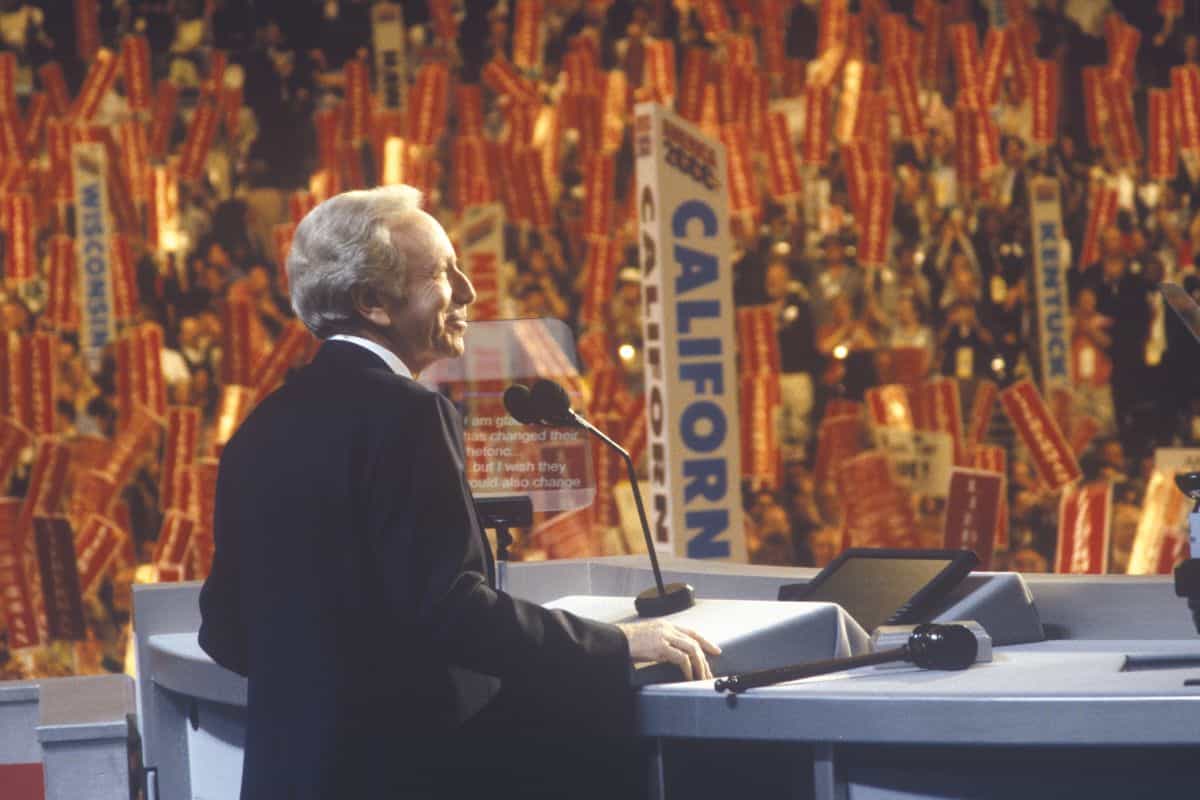Luke Tress (JTA)
Alison Sharaf, a staffer for Sen. Joe Lieberman in 2000, remembers the moment she heard that he would be making history.
Sharaf, then a manager in Lieberman’s Hartford office, was confident that Al Gore would pick her boss to be his running mate on the Democratic ticket — despite fears that the country was “not ready” to vote for an Orthodox Jew. She got to the office at 3 that morning anticipating the announcement and, later, Lieberman celebrated the news with her and the rest of his team.
“The whole staff in Connecticut, he took us on a boat ride down the Connecticut River and said our lives are about to change,” Sharaf, standing outside Lieberman’s funeral on Friday, March 29 told JTA. “He’s very forthcoming, he’s very honest, just tells it like it is and he’s a good human being.”
Sharaf and hundreds of others mourned Lieberman as a model of decency and bi-partisan cooperation that they believe is missing in Washington today at his funeral in his hometown of Stamford, Connecticut. The service was held in his synagogue, Agudath Sha-lom, and not far from Stamford High School, where Lieberman was class president and named “most likely to succeed” in 1960.
The funeral drew a diverse crowd of young and elderly, secular and religious, who lined up outside the synagogue in the bright morning sun. The American and Israeli flags outside the synagogue’s front door hung at half-mast. The crowd filled the synagogue.
Lieberman’s daughter, Hani Lowenstein, described how her father was on a warm, first-name basis with everyone from his colleagues to Capitol Police officers.
“Everyone knew they would be received by a warm smile,” she said in an emotional speech. “You genuinely cared about every person you interacted with.”
His son, Matt Lieberman, called his father a “supreme mensch.”
“He was blessed and he was a blessing for all of us,” he said. The family members’ speeches drew some tears in the audience.
Sharaf, who worked for Lieberman from 1997 to 2001, highlighted his famous friendship with Republican Sen. John McCain as a model of political tolerance. “That’s the way it’s supposed to be done, but those days are over,” she said.
In 2008 Lieberman, then an independent, endorsed McCain’s Republican presidential bid and was vetted to be his vice presidential nominee. At the time, the move drove a wedge between Lieberman and his longtime party, but those tensions did not appear at the funeral. A range of former and current Democratic leaders spoke warmly about him — including Connecticut Gov. Ned Lamont, who beat Lieberman in the state’s hard-fought Democratic senatorial primary in 2006, then lost to him in the general election.
Speakers at the ceremony also included Gore and Chris Murphy, Richard Blumenthal, and Chris Dodd, all current and former Connecticut senators who knew Lieberman and his family through his long career in the state’s politics. Speakers hailed Lieberman’s religious faith, independent streak, and commitment to his family and community.
Gore, who flew in from Tennessee, said Lieberman led a “life of constant consequence for his family, his friends, his nation.”
The two were close before their presidential run and their families knew each other well, Gore said, speaking beneath the spacious synagogue’s soaring stained-glass windows.
“We laughed together, we fought like hell together for what we wanted our country to be,” Gore said.
He hailed Lieberman’s commitment to “reconciliation as a form of grace” in politics, an approach Gore said was needed to “heal the rancor in our nation today.”
Murphy said that while he was coming up in politics, Lieberman was “a giant to me” who decided his position on an issue “regardless of its political origin.”
Lieberman had a “decency that will never show up in the history books,” Murphy said, recounting how Lieberman had written a lengthy condolence letter to a woman he barely knew when her father died.
The synagogue’s rabbi, Daniel Cohen, said Lieberman was “truly a stranger to no one.”
“He saw the divine in everyone he met,” Cohen said.

